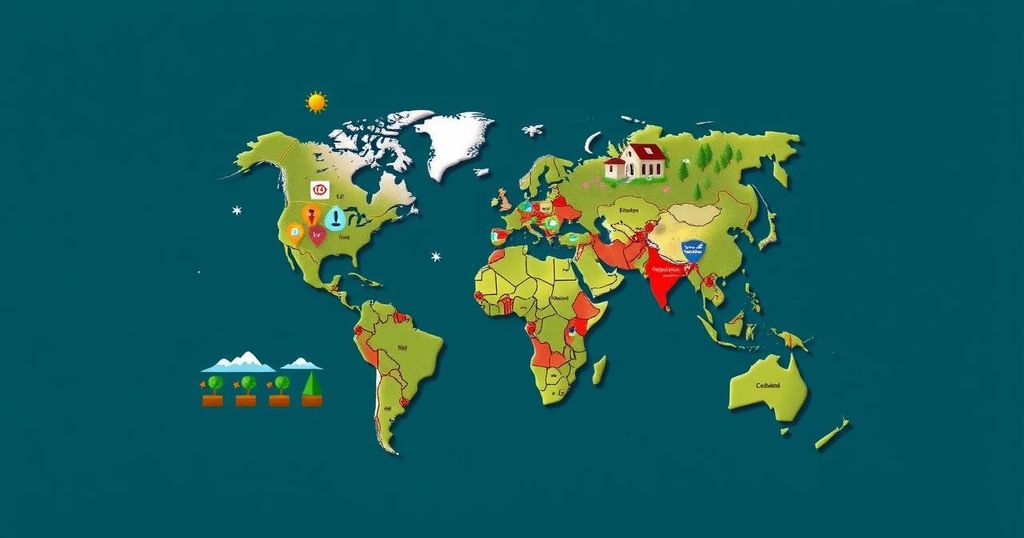The United Nations warns that current national emissions pledges are grossly inadequate to meet the goals of the Paris Agreement, with only a projected 2.6% reduction from 2019 levels expected by 2030. Secretary General Simon Stiell stresses the need for stronger national contributions, especially with pivotal climate negotiations approaching. The World Meteorological Organization reports record levels of greenhouse gases, heightening the urgency for decisive climate action.
The United Nations has warned that current national commitments to reduce greenhouse gas emissions are significantly insufficient to avert catastrophic global warming. According to an annual assessment by the United Nations Framework Convention on Climate Change (UNFCCC), the pledges made by countries—known as nationally determined contributions (NDCs)—will only achieve a 2.6% reduction in global emissions from 2019 to 2030, marginally up from a 2% reduction reported last year. Notably, this reduction is starkly below the predicted 43% cut needed to adhere to the Paris Agreement’s target of limiting the increase in global temperatures to 1.5 degrees Celsius (2.7 degrees Fahrenheit). UNFCCC Secretary General Simon Stiell emphasized the urgency of stronger NDCs, stating, “Current national climate plans fall miles short of what’s needed to stop global heating from crippling every economy and wrecking billions of lives and livelihoods across every country.” With a crucial deadline for improved NDCs set for February of the following year, Stiell asserted that the forthcoming pledges must clearly indicate a pathway for achieving necessary climate action. The success of the upcoming COP29 climate negotiations, scheduled to take place in Baku, Azerbaijan, plays a central role in motivating countries to elevate their climate commitments. At the aforementioned talks, nearly 200 nations are expected to negotiate plans for a new global emissions trading system and discuss the crucial $100 billion annual aid package intended to assist developing nations in meeting their climate targets. Pablo Vieira, global director of the NDC Partnership, acknowledged that the push for enhanced ambition via the NDC process may often hinge on financial negotiations, ensuring that new commitments are attractive to both public and private investments. Simultaneously, the World Meteorological Organization (WMO) has issued a concerning report indicating that greenhouse gas levels in the atmosphere are rising at unprecedented rates. Last year, atmospheric carbon dioxide levels reached a record high of 420 parts per million, illustrating an alarming increase of 2.3 ppm from the previous year and a total increase of 11.4% over the past two decades. WMO Secretary General Celeste Saulo reiterated the seriousness of these figures, suggesting that they should alarm decision-makers globally, as “Every part per million and every fraction of a degree temperature increase has a real impact on our lives and our planet.”
The ongoing challenges posed by climate change have prompted nations worldwide to submit nationally determined contributions (NDCs) as part of the Paris Agreement. The agreement aims to limit global warming to well below 2 degrees Celsius, with a target of 1.5 degrees Celsius. However, current NDCs are insufficient to meet these goals, setting the stage for growing international dialogue and negotiation on climate finance and emissions reductions.
In conclusion, the United Nations has highlighted that national pledges to reduce emissions remain alarmingly inadequate, necessitating renewed commitments ahead of critical negotiations at COP29. The stark increase in greenhouse gases further underscores the urgency of effective climate action, with financial aid and actionable plans being imperative for developing nations. Only through ambitious and collaborative efforts can the global community hope to mitigate the impactful effects of climate change and work toward achieving the targets set forth in the Paris Agreement.
Original Source: kfgo.com






